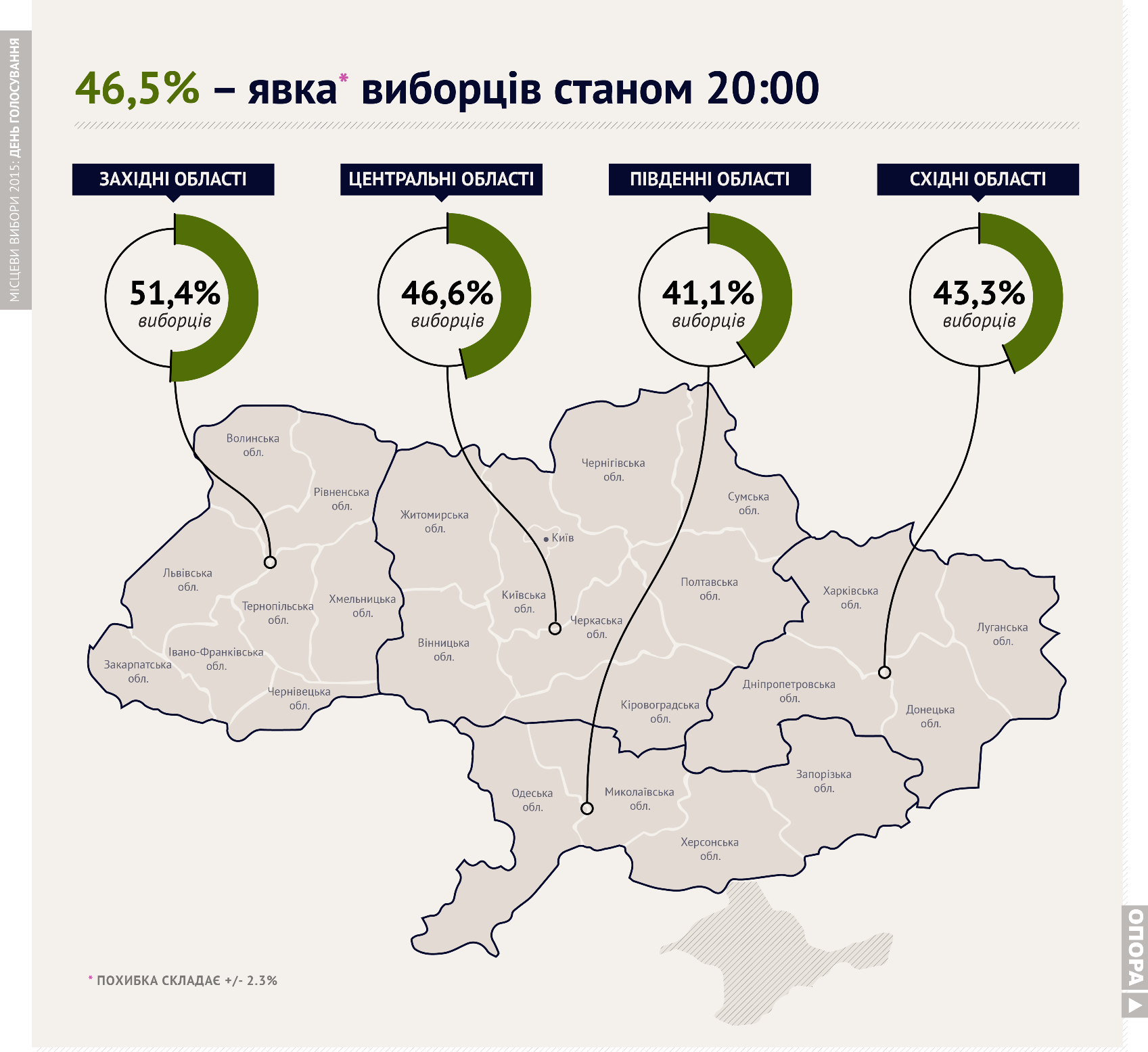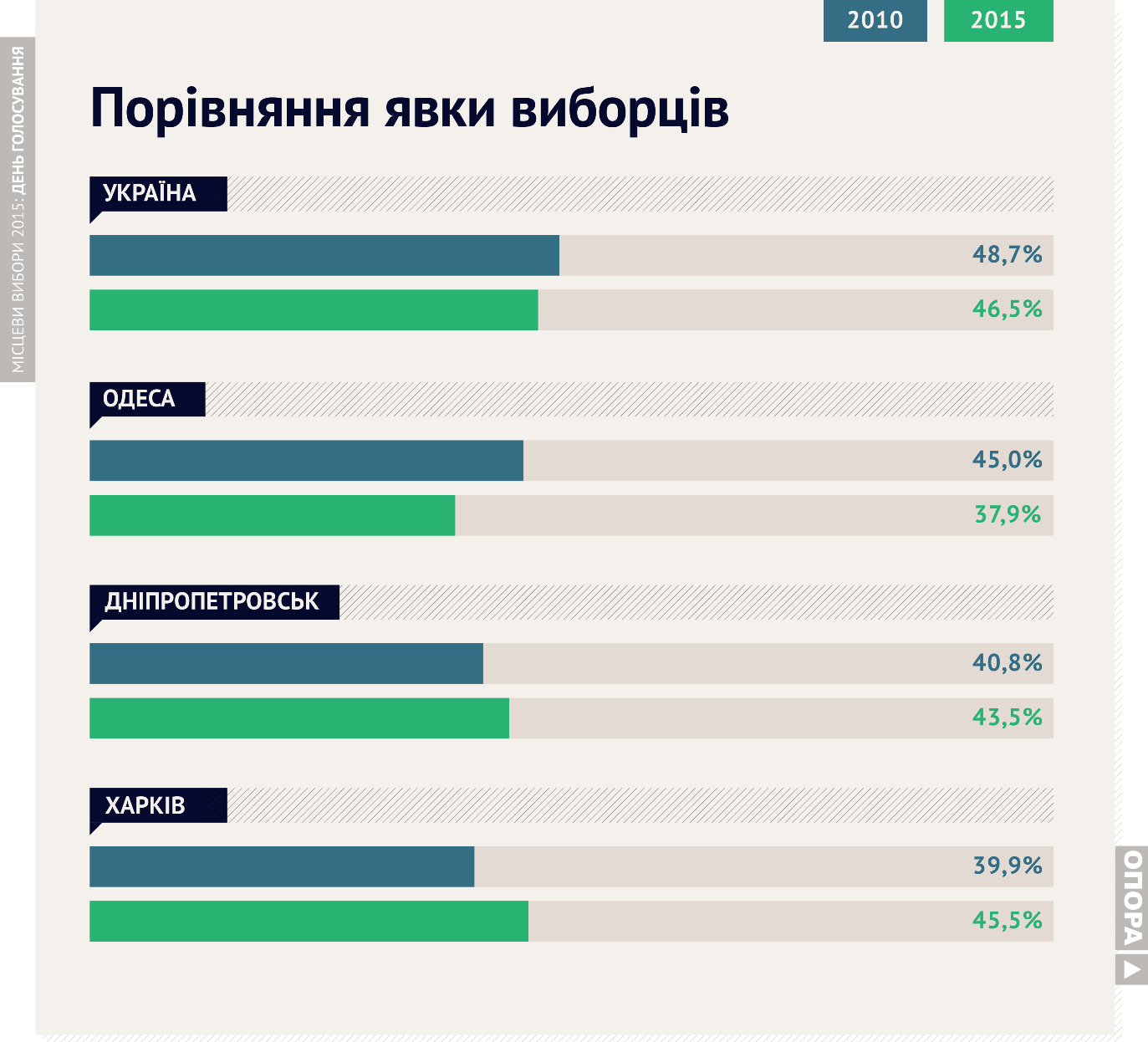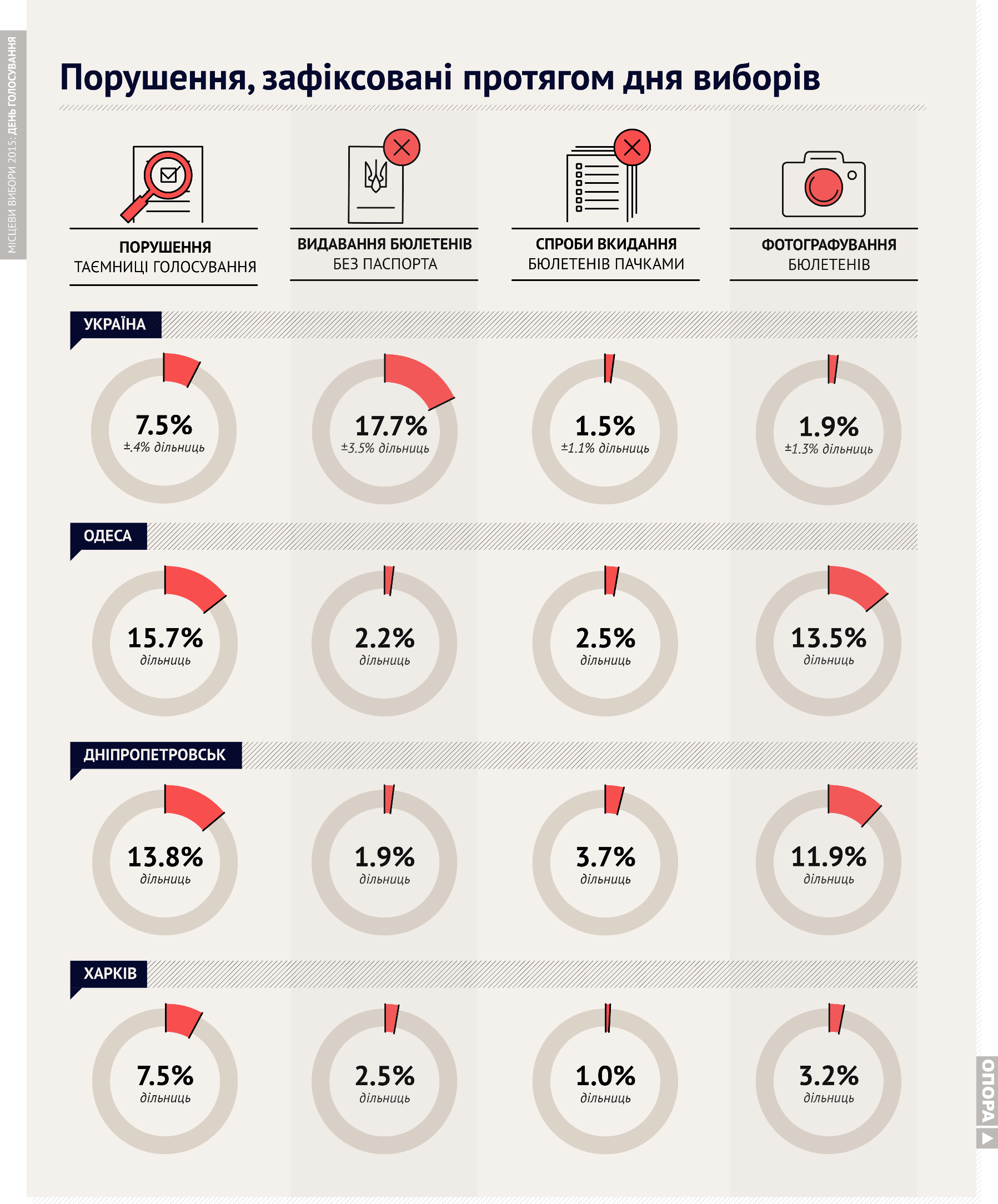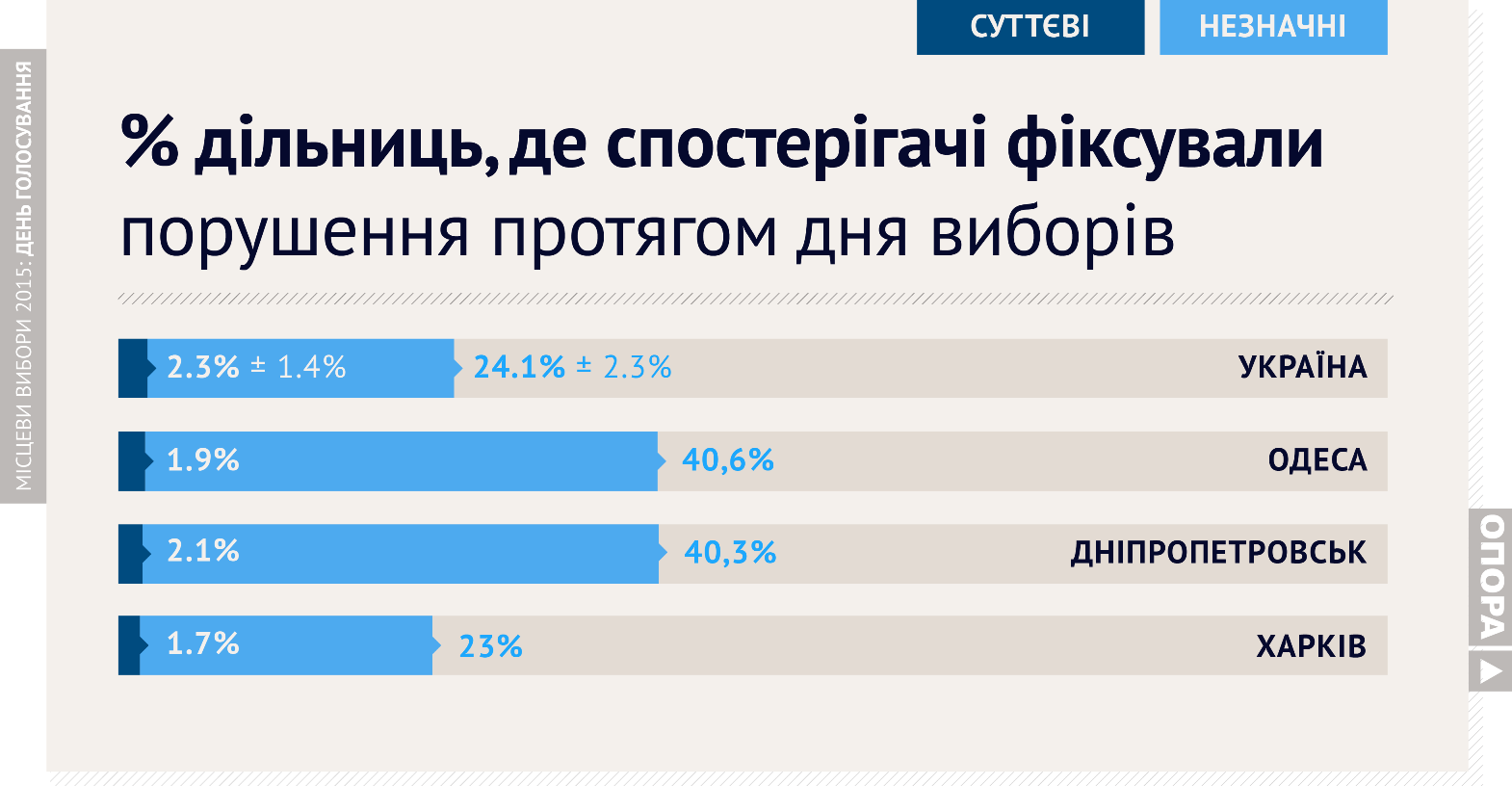Â
Local elections in Ukraine were held with numerous violations of the electoral process organization procedure and international standards including Main drawbacks concerned instable electoral legislation and vague procedures, violation of equal opportunities principle and the principle of balanced proportion of mandates, low level of ballot papers security and violations which may be specified and voter bribery. However, Civil Network OPORA affirms that election day violations were usually unsystematic and didn't have significant influence on election results or vote count process, and the campaign itself was quite competitive. Final summary on regular local elections will be published by Civil Network OPORA only after territorial election commissions finish all the procedural activities and official election results are announced.
However, the fact that politically motivated but not legal grounds were used to stop the voting process in Mariupol and Krasnoarmiisk can be interpreted as obstruction to realization of citizen voting rights and the right to local self-government. Thus, these facts must be assessed by the Central Election Commission and law-enforcement bodies of Ukraine in an independent and unbiased manner.
OPORA's summary is based on the results of long- and short-term observation, criteria and principles of democratic elections established by documents of the Venice Commission, Copenhagen Conference, and the Organization for Security and Co-operation in Europe (OSCE).
Summary on the course of election campaign from Civil Network OPORA:
- Systematic problems emerged in application of the new Law on Local Elections due to the non-inclusive approach to its drafting and instability of electoral legislation as a whole. Some regulations of the Law were either declarative or didn't provide specific requirements to the procedures and, therefore, became a proof that legal framework was not prepared in proper way. The Central Election Commission sometimes even had to not only provide explanations on the certain law regulations, but also, in fact, take upon itself legislative functions of the parliament. For example, a situation with gender quotas in electoral lists of political parties, or a procedure of mandate distribution with consideration of the "first candidate in a list", which wasn't specifically defined by the legislation;
- Registration of candidates and party lists wasn't finished before the deadline established by the law in the certain communities and, therefore, opportunities of candidates for a comprehensive campaign were limited;
- Both parties/candidates electoral subjects and territorial election commissions failed to secure the transparency and accountability of campaign financing at an adequate level. Early campaigning before official registration of candidates was financed with violation of legislative requirements and systematical. The access to information about interim reports on campaign fund expenses wasn't secured in a way that the voters and NGOs could have had quick access to these data.
- Voter bribery incidents occurred in different regions of Ukraine, resulting from the fact that the certainty of punishment principle doesn't work in such cases and judiciary practices prove to be inefficient. However, law enforcement bodies are more active if compared to 2012 and 2014 parliamentary elections and 2010 local elections, and duly respond to requests of OPORA's observers. However, we will be able to assess the efficiency of investigations into this category of violations on the basis of court practices only after six months after the election campaign finishes.
- The scale of centralized misuse of administrative resources was much smaller if compared to 2010 elections, and it didn't have a systematic influence on the election process.
- There were many situations hazarding the election process itself if we mention about production of ballot papers. For example, approved forms with errors and inaccuracies or dubious interpretation of the law in regard to contracts with printing houses. As a result, ballot papers were considered inappropriate, additional expenses were made to print new ballots, or even the voting itself was canceled.
Typical violations, detected during the voting process and vote count
- OPORA's observers were watching the voting process and activities of election commission for the whole election day. OPORA secured comprehensive monitoring and reporting about violations noticed on the preparatory meetings of precinct election commissions and opening of polling stations, during the voting process, vote count in PECs and transference of documentation to DECs. All the violations that were detected by OPORA's observers were generalized and classified in order to assess the scale of violations and level of illegal influence on the election process.
- Thus, observers detected minor violations at 24.1% polling stations in Ukraine (margin of error is 2.3%). More significant violations occurred at 2.3% of polling stations in Ukraine (margin of error is 1.4%). As for the cities where observation covered all polling stations, minor violations were detected at nearly 40% of polls in Odesa and Dnipropetrovsk, and at 23% polls of Kharkiv. More significant violations were detected at 2.1% polls of Dnipropetrovsk, 1.9% polls of Odesa and 1.7% polls of Kharkiv. Although quite typical violations occurred in different regions, they were not systematic.
- It should be mentioned that a lot of violations resulted from low level of organization at election commissions, as well as political conflicts between electoral subjects yet on the stage of candidate registration, printing and transportation of ballots, and preparation to the election day.
- However, 17.7% of precinct election commissions started their preparatory meetings earlier than 7:15 a.m. on 25 October 2015.. As for the certain cities covered by OPORA's parallel vote tabulation, only Odesa (11.3%) and Dnipropetrovsk (11.5%) has smaller number of PECs which had started preparatory meetings too early, while Kharkiv has a percentage equal to nationwide. We would like to emphasize that according to the Law of Ukraine on Local Elections, PECs must hold their preparatory meetings not earlier than 45 minutes before the voting begins.
- All the precinct election commissions in the country conducted preparatory meetings, and gathered quorum (more than half of total commission membership). At the same time, 6.5 % of election commissions didn't keep the minutes of their preparatory meetings. This percentage in Dnipropetrovsk reaches 8.5%. There were only some incidents when observers reported disappearance or lack of PEC seals.
- According to the OPORA's data, more than 15.5% of polling stations opened earlier or later than time established by the legislation (8:00 AM on 25 October). Only a little more than 1% of OPORA's observers have reported that PECs failed to provide them with opportunity to conduct a comprehensive observation of all election procedures on morning meetings and the beginning of voting process. Besides that, 3% of observers have reported that there are some organizational problems and that some actions of election commission members made impossible both their presence at polling stations and unimpeded observation.
- The most typical violation was an attempt to issue (receive) ballots without previous passport verification. Such incidents were detected at 17.7% polling stations in Ukraine. As for the cities covered by OPORA's parallel vote tabulation, there were less attempts to issue ballots without previous passport verification: Kharkiv – 2.5% polling stations, Odesa – 2.2%, Dnipropetrovsk – 1.9%.
- Violation of the voting secrecy (demonstration of filled in ballots by the voters) was less spread. Such violations were detected at 7.5% polling stations in Ukraine. However, in Odesa, Dnipropetrovsk and Kharkiv such incidents occurred more often – 15.7%, 13.8% and 7.5% of polling stations respectively. It should be mentioned that deliberate violation of the voting secrecy, when choice of a voter is intentionally disclosed, shall be punished with a fine or corrective labor for up to two years, or restriction of liberty for up to three years.
- The voters were detected taking pictures of their ballots only at 1.9% of polling stations in Ukraine. However, in Odesa and Dnipropetrovsk, such violations occurred more often – at 13.5% and 11.9% of polling stations respectively. In Kharkiv, incidents when voters took pictures of their ballots occurred at 3.2% polling stations.
- Attempts of ballot-box stuffing were detected at 1.5% polling stations in Ukraine. These incidents in Dnipropetrovsk and Odesa occurred at 3.7% and 2.5% polling stations respectively. In Kharkiv, such violations were detected only at 1% of polling stations.
- Observers also reported that election commissions hindered and limited their activities and, as a result, they couldn't observe all the election procedures. Such situations occurred at 1.7% polling stations in Ukraine and 2.3% in Dnipropetrovsk as of 8 PM. In Odesa and Kharkiv, observers couldn't watch all the election procedures at 0.8% of polls. Besides that, observers also reported some incidents when the voters were deprived of the opportunity to cast vote.
Voter turnout on the Election Day (calculated by the OPORA)
Under the observation campaign, Civil Network OPORA conducted the parallel turnout tabulation. We collected the data as of 12:00 PM, 4:00 PM and 8:00 PM from polling stations where official observers of Civil Network OPORA were deployed in accordance with the representative sampling both at nationwide level and in each of four regions: West, Center, East and South. In Kharkiv, Odesa and Dnipropetrovsk, OPORA's observers were deployed to each polling station and calculated the voter turnout there.
Thus, the nationwide voter turnout in local elections was 46.5% as of 8 PM. Thus, for example, in Central oblasts (Vinnytsia, Zhytomyr, Cherkasy, Kyiv, Kirovohrad, Chernihiv, Sumy oblasts and Kyiv city) the voter turnout was 46.6%; Western oblasts (Lviv, Ivano-Frankivsk, Zakarpattia, Ternopil, Khmelnytskyi, Rivne, Volyn, and Chernivtsi oblasts) – 51,4%; in the East (Donetsk, Kharkiv, Luhansk and Dnipropetrovsk oblasts) - 43.3%; and South (Odesa, Kherson, Mykolaiv, and Zaporizhzhia oblasts) was 41.1%. The margin of error is 2.3%.

| Macro region | Turnout as of 12:00 PM | Turnout as of 4:00 PM | Turnout as of 8:00 PM |
| Event | 16.6 % | 38.1 % | 51.4 % |
| Center | 20.0 % | 37.4 % | 46.6 % |
| South | 18.0 %. | 32.6 % | 41.1 % |
| East | 18.6 % | 33.5 % | 43.3 % |
| All Ukraine | 18.5 % | 36.2 % | 46.5 % |

“The voter turnout in these elections is a little bit smaller than it was in 2010 local elections (48.7%). The difference, however, is only 2.2%. It should be mentioned that voter turnout was much higher every time elections to local self-government bodies coincided with parliamentary elections (75.6% in 1994, 70.8% in 1998, 69.3% in 2002, and 67.6% in 2006).
As for the certain cities covered by OPORA's parallel vote tabulation, Odesa has 37.9% turnout, Kharkiv and Dnipropetrovsk – 43,5%. To compare, Kharkiv had 39.9% voter turnout in 2010 local elections, Dnipropetrovsk – 40.8%, Kharkiv – 45%.
Disruption of elections in Mariupol and Krasnoarmiisk (Donetsk oblast) resulted from political schemes applied by electoral subjects, instead of using legal mechanisms established by Ukrainian legislation. The situation similar to those is these cities has also occurred in other cities or regions of Ukraine facing issues with production of ballot papers, the process of their receiving from manufacturing enterprises as well as transportation to PECs. However, the city of Mariupol failed to resolve these problems in a legitimate way. As a result of acute confrontations between different electoral subjects, the functioning of territorial election commissions became absolutely unstable, proving that political parties have excessive influence on TEC members.
In particular, we may tell from the succession of events in Mariupol that territorial election commission had enough time and mechanisms to produce ballot papers and organize the voting process in local elections. Besides that, Mariupol City Election Commission comprised local cells of different political parties and could secure good oversight under law regulations.
The candidates for Mariupol City Mayor and to Mariupol City Council were registered before 10/1/2015. Thus, in contrast to some other cities, they registered the candidates before the deadline, and this couldn't be a reason why production of ballot papers was so delayed.
However, Mariupol City Election Commission selected the printing house to produce ballot papers (printing house of the Pryazovskyi Robochyi newspaper) only on 10/17/2015, while the deadline for production of ballot papers was 10/14/2015 according to the law. However, the TEC demonstrated complete inaction before taking this decision, including the matter of ballot paper production. As a result, the CEC had early terminated authority of 7 its members (due to systematical ignorance of duties). Thus, TEC resolution on production of ballot papers was passed on its meeting on 10/17/2015 with 7 of 11 members attending[1]. Donetsk District Administrative Court has confirmed that this meeting of the TEC was legitimate[2]. Legal position of the OPORA is that quorum of the commission should be calculated from the total number of TEC members whose authority wasn't prematurely terminated (11 TEC members at the moment the decision on production of ballots was taken).
Selection of a printing house became a political, but not organizational issue in Mariupol. Some electoral subjects affirmed they don't trust printing house of the Pryazovskyi Robochyi newspaper, claiming that conflict of interests may arise during the election process in regard to its owner.
A requirement to avoid the conflict of interests involving owners or managers of the corresponding printing houses, which is not provided by the effective Law of Ukraine on Local Elections, wasn't applied in other cities, raions or regions. However, the election process should be based on equal application of the law.
After law-makers ignored public propositions concerning strengthening of oversight procedures in regard to ballot paper productions, electoral subjects in different cities and regions expressed their fears about the appropriate number of poduced ballots, proper destruction of wastage and reliable storage of ballot papers (for example, cities of Ternopil and Nizhyn in Chernihiv oblast and other). However, other territorial election commissions, in contrast to Mariupol, used legal mechanisms of the corresponding oversight commissions or other procedures to solve the problems. On the moment this report was prepared, neither members of the election commission, nor other electoral subject, nor law enforcement bodies have provided convincing evidences proving that the certain number of ballot papers was falsified in Mariupol. Besides that, the Law of Ukraine on Local Elections doesn't provide any legal grounds allowing the TEC to reject already produced ballots. In contrast to election commissions in other problematic territorial communities, which were painstakingly trying to resolve the issues related to production of ballot papers right before the election day, Mariupol City Election Commission had chosen to focus on internal confrontations and was deliberately delaying electoral procedures.
Territorial election commission in Krasnoarmiisk (Donetsk oblast) has passed a decision to accept ballot papers from a sole proprietor, but didn't transfer the ballots to election commissions for organization of the voting process on 25 October 2015. Ballot papers were considered inappropriate for the election process in regular local elections.
Krasnoarmiisk Election Commission refers to ruling of Donetsk District Administrative Court on case #805/4737/15-а. as of 10.25.2015. Thus, Donetsk District Administrative Court has repealed a resolution of Krasnoarmiisk City Election Commission on consideration of a sole proprietor as ballot paper producer, but didn't satisfy the other demands of the plaintiff (electoral subject) to oblige city election commission to refrain from transferring ballot papers to election commissions and produce new ballots. Donetsk District Administrative Court refused to recognize a sole proprietor as a ballot paper producer because, according to the Court, the Law says that only a legal entity registered as an "enterprise" may be a printing house. This court decision was acknowledged by the court of appeal on 10/25/2015.
It should be mentioned that many sole proprietors produce ballot papers for local elections in Ukraine (for example, sole proprietors produced ballot papers in elections to Cherkasy City Council, Mykolaiv City Council, Kamianets-Podilskyi City Council, Dunaievets and Novoushytska raion councils in Khmelnytsk oblast etc.). At the same time, Donetsk District Court didn't oblige the TEC to take the certain measures in regard to ballot papers.
The CEC, however, passed a Resolution #513 of 10/25/2015 repealing the resolution of Krasnoarmiisk City Council concerning a ban on sending produced ballots to PECs, and obliged precinct election commissions, responsible for organization and conduct of elections to Krasnoarmiisk City Council and of Krasnoarmiisk Mayor, to receive the corresponding ballot papers and organize the election day in accordance with the Law of Ukraine on Local Elections. Such decision of the CEC wasn't put into practice, while it could have been implemented only a few hours before the end of election day. Thus, the voters in Krasnoarmiisk (Donetsk oblast) didn't have a chance to realize their constitutional right to elect local self-government bodies. Similarly to Mariupol, functioning of the TEC was unstable and there was acute confrontation between electoral participants.
Disruption of election process in Mariupol and Krasnoarmiisk is going to have sudden legal consequences. The Law of Ukraine on Local Elections doesn't provide any solutions in situations when territorial election commissions cannot secure production of ballot papers and transfer them to PECs.
In order to guarantee the rights of citizens living in cities of Mariupol and Krasnoarmiisk, the Parliament will have to make quick election law amendments able to resolve such unforeseen situation. Besides that, the government should apply efficient guarantees of electoral rights and create conditions for citizen participation in local self-government. OPORA calls on state authorities at all levels to restrain from using this disruption as grounds for restriction of local self-government in these cities.
Â
The final report on observation results containing detailed findings of the Civil Network OPORA are going to be published in a few weeks. OPORA will also include recommendations for improvement of electoral process in this report.
Â
Civil Network OPORA conducts citizen observation of local elections in Ukraine, scheduled for 25 October 2015. Civic monitoring conducted by OPORA - is a type of network activity, aimed at impartial assessment of the preparation and conduct of elections, as well as preventing electoral violations through comprehensive civic action. 144 long-term observers were deployed to all Ukrainian regions on 5 September, and 3000 short-term observers will join them on the election day.
Â
[1] Local party cells which TEC representatives were early withdrawn have registered new representatives in the corresponding election commission.

